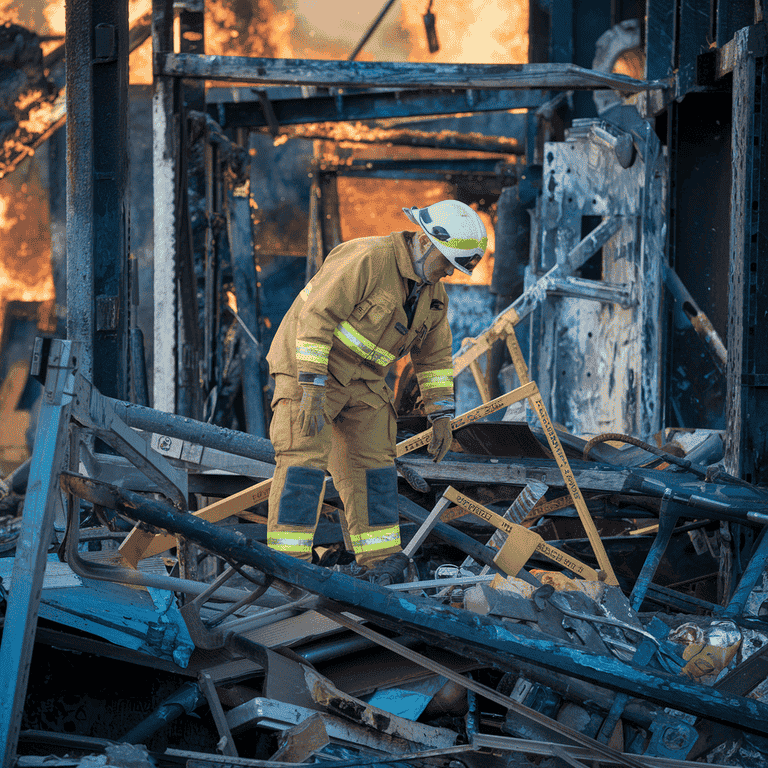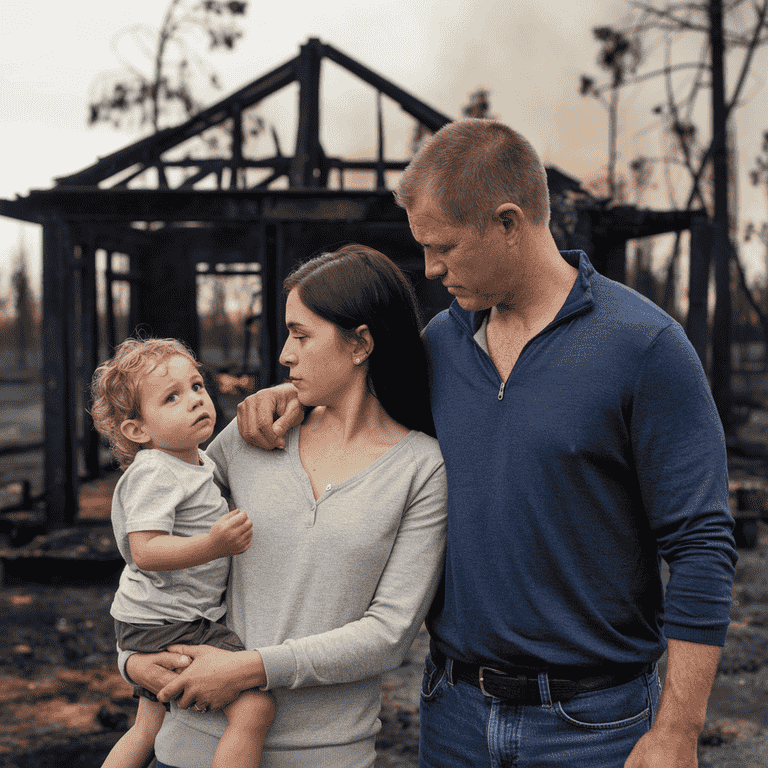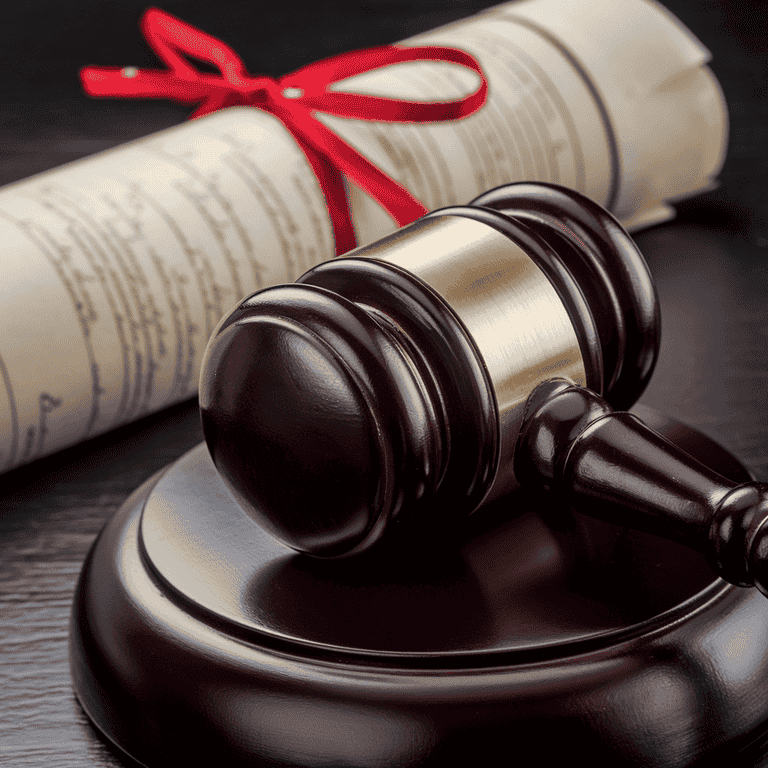Definition and Types of Arson
What is Arson?
Arson is a crime involving the intentional setting of a fire to property. In legal terms, arson requires proof that a person willfully and maliciously set fire to a building, vehicle, or other property. Simply causing a fire by accident or negligence typically doesn’t qualify as arson.
The act must be done with intent, meaning the person wanted to cause damage or harm through fire. Whether it’s a home, business, or forest, the law treats arson as a serious offense because of the potential risk to lives and property.
Degrees of Arson
Arson is often categorized into degrees depending on the severity of the act. These degrees generally account for the type of property burned and whether anyone was harmed.
- First-degree arson: This involves setting fire to a building or home where people are present. The risk to human life makes it the most serious form of arson.
- Second-degree arson: This typically involves setting fire to an unoccupied building or property. The damage is still serious, but the absence of people makes it a lesser offense.
- Third-degree arson: This generally involves setting fire to personal property or land, such as a vehicle or forest, without the intent to harm anyone.
Criminal vs. Civil Arson
Arson can be pursued both criminally and civilly, depending on the situation.
- Criminal arson: The government prosecutes the person responsible, and if found guilty, they face fines and prison time.
- Civil arson: A private party, such as a property owner, can sue the arsonist for damages, especially if the fire was set to harm them financially.
Arson vs. Related Crimes
Arson is distinct from other property crimes.
- Vandalism: While both involve damage, arson specifically refers to damage caused by fire.
- Burglary and arson: Some cases may involve both, where someone breaks in and starts a fire to cover their tracks, but they remain separate crimes.
Arson often carries harsher penalties because of the unpredictability and potential harm caused by fire.
Legal Consequences of Arson
Criminal Penalties
The penalties for arson depend on the degree of the crime, the location, and the damage caused. In most cases, sentencing ranges from fines to long-term imprisonment.
- Prison sentences: First-degree arson can lead to sentences of 10 years or more, especially if lives were endangered.
- Fines and restitution: Courts may also require the arsonist to pay fines or compensate the victims for property damage. This could involve large sums if buildings or vehicles were destroyed.
Aggravating Factors in Arson Sentencing
Certain factors can increase the severity of the punishment, especially when the arson leads to greater harm.
- Injury or death: If someone is hurt or killed because of the fire, the arsonist may face more severe penalties, including charges of manslaughter or murder.
- Explosives: Using explosive materials to commit arson leads to higher charges, as the risk of widespread damage increases.
- Covering up another crime: When arson is used to hide evidence of another crime, the sentence may be extended to account for both crimes.
Defenses to Arson Charges
Lack of Intent
For a charge of arson to stick, intent is key. A fire caused by accident doesn’t usually count as arson. The defense may argue that the fire was unintentional, perhaps caused by negligence or an accident.
Alibi or Mistaken Identity
In some cases, the accused may not have been near the scene when the fire started. Witnesses or surveillance footage could help prove that the person was elsewhere when the fire began.
Insufficient Evidence
If the prosecution cannot provide strong evidence linking the accused to the crime, such as a lack of fingerprints, DNA, or eyewitness accounts, the case might be dismissed.
Mental Health Defenses
A person might also plead insanity or diminished capacity, suggesting they were not fully aware of their actions at the time. In some cases, this leads to treatment rather than jail time.

Investigation and Prosecution of Arson
Fire Investigation Techniques
Investigating an arson case is a meticulous process. Fire investigators play an important role in determining how and why a fire started. They look for evidence that can reveal the truth behind the flames.
Some common techniques used include:
- Scene examination: Investigators inspect the fire scene for clues. They look at burn patterns, which can indicate how the fire started.
- Collecting evidence: Physical evidence like debris and accelerants are collected for analysis. This helps pinpoint the cause of the fire.
- Witness interviews: Fire investigators often interview witnesses to gather information. Eyewitness accounts can provide valuable insights into the events leading up to the fire.
Evidence in Arson Cases
In arson cases, evidence is critical. Without it, proving guilt can be challenging. Here are some key types of evidence that may be used in court:
- Forensic evidence: This can include traces of accelerants like gasoline or lighter fluid. Chemical analysis can confirm their presence.
- Eyewitness testimony: People who saw or heard something relevant can offer important details. Their accounts may help establish a timeline of events.
- Surveillance footage: Cameras near the fire scene can capture key moments. This can include the person setting the fire or fleeing the area.
Common Challenges in Prosecuting Arson
Prosecuting arson can be difficult. Several challenges may arise during a case:
- Proving intent: One of the most significant hurdles is demonstrating that the defendant had the intent to start the fire. This can be tough, especially if the fire was accidental.
- Identifying suspects: Sometimes, it’s unclear who started the fire. Lack of witnesses or physical evidence can make it hard to pinpoint a suspect.
- Handling technical details: Arson cases often involve complex scientific evidence. Jurors may struggle to understand the technical aspects without proper explanations.
Motivations for Committing Arson
Financial Gain
Many individuals commit arson for financial reasons. Insurance fraud is a common motive. Here’s how it often works:
- Burning property for insurance money: Some people set fire to their homes or businesses to collect insurance payouts. This can be tempting for those facing financial struggles.
- Destroying evidence: In other cases, arson may be committed to conceal other illegal activities, such as drug dealing or theft.
Revenge or Personal Grievances
Arson can also stem from personal motives. Anger and revenge can drive someone to commit this crime. Common scenarios include:
- Targeting individuals: A person may set fire to someone’s property out of spite or anger. This can happen in disputes or relationship breakups.
- Attacking businesses: Some individuals may target businesses they feel wronged by. This could be a competitor or a former employer.
Psychological Factors
Mental health issues can lead to arson. Some individuals may struggle with disorders that compel them to start fires. For example:
- Pyromania: This condition involves an irresistible urge to set fires. Those affected often feel a sense of pleasure or relief from starting a fire.
- Other mental health issues: Other psychological disorders can also contribute. These may include severe depression or impulse control disorders.
Political or Ideological Motivations
Arson isn’t always personal. Sometimes it’s driven by broader causes. Here are a few examples:
- Acts of terrorism: Some individuals commit arson as a political statement. These acts may target government buildings or symbols of authority.
- Social protests: In some cases, groups may use arson as a form of protest. This could involve setting fire to property to draw attention to a cause.

Impact of Arson on Victims
Physical and Emotional Damage
The aftermath of arson can be devastating. Victims often face serious physical and emotional consequences:
- Injuries and fatalities: Arson can lead to severe injuries or even death. This tragedy can leave lasting scars on survivors and families.
- Emotional trauma: Survivors may experience anxiety, depression, or post-traumatic stress disorder (PTSD). The fear of another fire can linger long after the flames are extinguished.
Financial Losses
The financial impact of arson is substantial. Victims may incur significant costs, such as:
- Property damage: Homes, businesses, and personal belongings can be destroyed. Rebuilding or repairing can be extremely expensive.
- Insurance claims: While some victims have insurance, not all losses are covered. Disputes with insurance companies can further complicate recovery.
Community and Environmental Impact
Arson doesn’t just affect individual victims. It can also harm entire communities. Here’s how:
- Neighborhood effects: Fires can lead to property devaluation in neighborhoods. This affects local businesses and residents alike.
- Environmental damage: Large fires can devastate natural landscapes, destroying wildlife habitats and polluting air and water sources.
Prevention and Fire Safety Measures
Fire Safety Education
Educating the public on fire safety is essential. Community programs can make a difference by:
- Teaching fire prevention: Schools and local organizations can offer classes. These lessons can help people recognize fire hazards and reduce risks.
- Promoting safety measures: Installing smoke detectors and fire extinguishers can save lives. Public awareness campaigns can encourage these actions.
Arson Prevention Strategies
Preventing arson requires proactive measures. Communities can implement strategies such as:
- Installing security systems: Surveillance cameras can deter potential arsonists. They provide a visible reminder that actions are being monitored.
- Community vigilance: Neighborhood watch programs encourage residents to report suspicious activity. This can help catch arsonists before they strike.
Legal Measures to Prevent Arson
Laws can help deter arson. Some key legal measures include:
- Regulating fire accelerants: Stricter laws on the sale and possession of flammable materials can reduce arson incidents.
- Penalties for illegal possession: Stiff penalties for those caught with incendiary devices can act as a deterrent.

Arson Laws in Nevada
Overview of Arson Laws
Nevada takes arson very seriously. The state has specific laws aimed at addressing various types of arson. Understanding these laws is essential for anyone living in or visiting Nevada. Here’s a quick look at how Nevada defines arson:
- Arson Defined: In Nevada, arson is the willful and malicious act of setting fire to property. This includes buildings, vehicles, and even forests.
- Categories of Arson: The law categorizes arson into different degrees, each with its own penalties. These include first-degree, second-degree, and aggravated arson.
Degrees of Arson in Nevada
Nevada classifies arson based on the nature of the act and the property involved. Here’s a breakdown:
-
First-Degree Arson:
- Involves setting fire to an occupied structure.
- This includes homes, businesses, and any building where people may be present.
- Penalties can range from 10 years to life in prison, along with hefty fines.
-
Second-Degree Arson:
- Involves setting fire to unoccupied structures or property.
- This can include vacant buildings, vehicles, and other properties.
- Penalties typically involve 1 to 6 years in prison and significant fines.
-
Aggravated Arson:
- This charge applies when the fire results in injury or death.
- It involves a higher degree of intent and recklessness.
- Penalties can include life imprisonment and substantial financial restitution.
Penalties for Arson
The penalties for arson in Nevada are severe. Here’s what someone might face if convicted:
| Degree of Arson | Prison Time | Fines |
|---|---|---|
| First-Degree Arson | 10 years to life | Up to $100,000 |
| Second-Degree Arson | 1 to 6 years | Up to $50,000 |
| Aggravated Arson | Life imprisonment | Restitution for damages |
Factors Influencing Sentencing
Several factors can influence the severity of the sentence. Here’s what the court may take into account:
- Intent: If the act was premeditated, the sentence may be harsher.
- Previous offenses: Repeat offenders can expect stricter penalties.
- Damage caused: The extent of property damage and any injuries sustained will play a role.
Defenses Against Arson Charges in Nevada
If someone faces arson charges, several defenses may be available under Nevada law:
- Accidental fire: Proving that the fire was accidental can help.
- Lack of intent: Demonstrating that there was no intent to cause harm can be a strong defense.
- Alibi: If a person can provide evidence that they were not present at the scene, this can negate the charges.
Resources for Legal Support
Those accused of arson should seek legal counsel. Here are some resources for legal support in Nevada:
- Nevada Legal Services: Provides free legal assistance to those who qualify.
- Local law firms: Many attorneys specialize in criminal defense, including arson cases. It’s essential to choose a lawyer who understands Nevada’s laws.

Breaking It Down for You
Arson is a serious offense in Nevada, carrying significant legal implications. Understanding the state’s laws is important for anyone affected by these charges, whether directly or indirectly. The different degrees of arson reflect the varying levels of intent and harm involved in such acts, with severe penalties for those found guilty.
For anyone facing arson charges, seeking knowledgeable legal representation is vital. Experienced attorneys can navigate the challenges of the law, providing guidance and support throughout the legal process. The consequences of arson can impact not just the accused but also victims and communities.
Staying informed about the laws surrounding arson in Nevada helps individuals and businesses take preventive measures. Fire safety awareness, responsible property management, and knowing your rights are key components in addressing this issue.
If you or someone you know is dealing with arson-related concerns, reach out to a legal professional for support. Protecting yourself and your interests is essential, and understanding your options can make a significant difference.

Frequently Asked Questions
What is the difference between arson and accidental fire?
Arson involves intentionally setting fire to property, while an accidental fire occurs without intent to cause damage. In cases of arson, there is often a motive behind the act, such as financial gain or revenge. Accidental fires, on the other hand, can happen due to negligence or unforeseen circumstances.
What are the potential defenses against arson charges?
Defenses against arson charges can include proving that the fire was accidental, demonstrating that the accused had no intent to cause harm, or establishing an alibi. Additionally, challenges to the evidence presented by the prosecution can also form part of the defense strategy.
How does Nevada classify arson offenses?
In Nevada, arson offenses are classified into different degrees based on the intent, the type of property involved, and the potential harm caused. The classification ranges from arson in the first degree, which involves structures that are occupied, to lower degrees for unoccupied structures or property.
What are the penalties for arson in Nevada?
Penalties for arson in Nevada can vary widely depending on the degree of the offense. First-degree arson can lead to significant prison sentences and hefty fines, while lower degrees may result in lighter sentences. Factors such as prior criminal history and the extent of damage caused also influence sentencing.
Can insurance cover damages from arson?
Insurance policies may cover damages from arson, but it often depends on the circumstances and the terms of the policy. If the insured party is found to have committed arson, they may be denied coverage. Always check with your insurance provider for specific details regarding coverage for fire damage.
What should I do if I suspect arson?
If you suspect arson, it’s important to report it to local authorities immediately. Providing them with any relevant information can assist in their investigation. Avoid confronting anyone you suspect might be involved, as it could compromise safety and the investigation.
How can businesses protect themselves against arson?
Businesses can take various steps to protect themselves from arson, including implementing security measures like surveillance cameras, proper lighting, and secure storage for flammable materials. Additionally, creating a fire safety plan and educating employees about fire hazards can further enhance safety.
Is it possible to get a record expunged after an arson conviction?
In Nevada, expungement of a criminal record is possible under certain conditions. However, arson is considered a serious crime, and eligibility for expungement can be limited. Consulting with a legal professional can provide guidance on the expungement process and its feasibility for specific cases.
What role does intent play in arson cases?
Intent is a critical factor in arson cases. The prosecution must prove that the accused intended to set the fire and cause damage. If the intent cannot be established, it may lead to a reduction in charges or a complete dismissal of the case.
How can I find a lawyer experienced in arson cases?
Finding a lawyer experienced in arson cases can be done through various means. Online searches, legal directories, and recommendations from friends or family can be useful. It’s important to consult with potential attorneys to discuss their experience, approach, and fees before making a decision.

Glossary
Arson: The criminal act of deliberately setting fire to property, intending to cause damage.
Accidental Fire: A fire that occurs unintentionally, often due to negligence or unforeseen circumstances, without intent to cause harm.
Intent: The purpose or mindset behind an action; in arson cases, it refers to the intention to set a fire and cause damage.
First-Degree Arson: The most serious classification of arson, involving the intentional burning of occupied structures, such as homes or businesses.
Second-Degree Arson: A lesser classification, typically involving the burning of unoccupied structures or property without intent to harm people.
Third-Degree Arson: The least serious form of arson, which may involve the destruction of property that does not fall under the more severe classifications.
Defense: A legal strategy or argument presented by the accused to counter charges against them.
Alibi: Evidence that proves a person was elsewhere at the time a crime was committed, potentially clearing them of wrongdoing.
Insurance Coverage: Protection provided by an insurance policy, which can reimburse the insured for losses due to specific events, including fire damage.
Expungement: The legal process of removing or sealing a criminal record from public view, allowing individuals to start fresh after serving their sentence.
Penalties: Legal consequences or punishments imposed for committing a crime, which can include fines and imprisonment.
Surveillance Cameras: Devices used for monitoring and recording activities in a specific area to deter crime and enhance security.
Fire Safety Plan: A set of procedures and guidelines designed to protect people and property from fire hazards.
Flammable Materials: Substances that can easily catch fire and burn, posing a risk in the context of fire safety and arson.
Prosecution: The legal party responsible for presenting the case against an accused individual in a criminal trial.
Credibility: The quality of being trusted or believed, especially regarding witness testimony or evidence in a legal context.
Investigative Authorities: Law enforcement agencies or officials responsible for gathering evidence and solving crimes, including arson cases.
Damages: Financial compensation awarded to a victim for losses or injuries incurred as a result of a crime or wrongdoing.
Motive: The underlying reason or motivation behind a person’s actions, particularly in the context of criminal behavior.

Additional Resources for You
Molly Rosenblum, Esq., our lead attorney, has gone above and beyond in providing a wide array of resources for those facing legal challenges. Through the Rosenblum Law website, a comprehensive suite of resources is available, offering guidance and experienced legal advice across various areas of criminal defense. These resources have been meticulously created to assist you during your time of need, ensuring you have access to valuable information and insights to navigate through complex legal issues. Here’s a brief overview of the resources available:
-
Criminal Defense Attorneys: An extensive resource offering expert defense strategies and legal assistance for individuals facing criminal charges. Explore here.
-
Las Vegas DUI Lawyer: Specialized legal advice and representation for those charged with DUI offenses in Las Vegas. Learn more.
-
Domestic Violence Lawyer Las Vegas: Dedicated support for individuals accused of domestic violence, providing legal representation and guidance. Read more.
-
Drug Possession Lawyer: Expert legal assistance for drug possession charges, offering strategies for defense and mitigation. Start your defense.
-
Sex Crimes Attorney: Specialized defense for those accused of sex crimes, focusing on protecting rights and reputation. Understand your options.
-
CPS Defense Attorney: Representation and advice for individuals facing child protective services investigations or accusations of child abuse and neglect. Get help now.
-
Misdemeanor Lawyer: Legal support for those charged with misdemeanor offenses, aiming for the best possible outcomes. Learn about defenses.
-
Juvenile Defense Lawyers: Dedicated legal services for juveniles facing criminal charges, focusing on rehabilitation and favorable resolutions. Protect your child’s future.
-
Las Vegas Warrant Defense Attorney: Assistance for individuals with outstanding warrants, aiming to resolve issues and avoid arrest. Resolve your warrant.
-
Las Vegas Probation Violation Attorney: Expert legal representation for probation violations, helping to avoid harsh penalties. Address probation issues.
-
Theft Crime Defense Lawyer: Defense strategies and legal advice for those accused of theft, focusing on reducing charges or seeking dismissal. Defend against theft charges.
-
Kidnapping Lawyers: Specialized legal representation for serious charges like kidnapping, focusing on a comprehensive defense. Get expert help.
-
Firearms Lawyer Las Vegas: Legal advice and representation for firearms-related charges, ensuring your rights are protected. Learn about firearm defense.
Molly Rosenblum, Esq., through these resources, aims to provide those facing legal challenges with the support and guidance needed to navigate their situations effectively. We encourage you to utilize these resources, ensuring that you have the necessary knowledge and legal support during your time of need.

Offsite Resources for You
Here are some additional resources that you might find useful:
- American Bar Association: This site offers a plethora of legal resources, including information on finding legal help and understanding your rights.
- National Fire Protection Association: This organization provides resources on fire safety and prevention, which can be useful in understanding the context of arson charges.
- U.S. Department of Justice: The DOJ’s website includes a wealth of information on federal laws and procedures, as well as resources on different types of crimes, including arson.
- Federal Bureau of Investigation: The FBI’s site provides information on how they handle investigations into major crimes, including arson.
- The Innocence Project: This organization works to exonerate the wrongly convicted and reform the criminal justice system. They have resources on understanding your case and your rights.
- Legal Information Institute – Cornell Law School: This site provides free access to a comprehensive collection of U.S. laws and legal terminology, including specific statutes on arson.
- FindLaw: This site offers a wide array of legal information and resources, including an extensive library of legal articles and a directory of criminal defense attorneys.

A Special Message from Our Lead Attorney

Molly Rosenblum
Dear Reader,
Thank you for taking the time to review the arson resources we’ve compiled.
We understand that facing criminal charges can be an overwhelming experience, and we hope these materials have helped provide some insight and guidance.
Knowledge is power, but having personalized, effective legal advice is crucial when navigating the complexities of the legal system. As such, I invite you for a free consultation with our team.
Please call us directly at (702) 433-2889.
During this consultation, we can discuss your situation in more detail, answer any questions you may have, and explore potential strategies for your defense.
Remember, you do not have to face this challenging time alone – we are here to help.
Best regards,
Molly Rosenblum, Esq.




